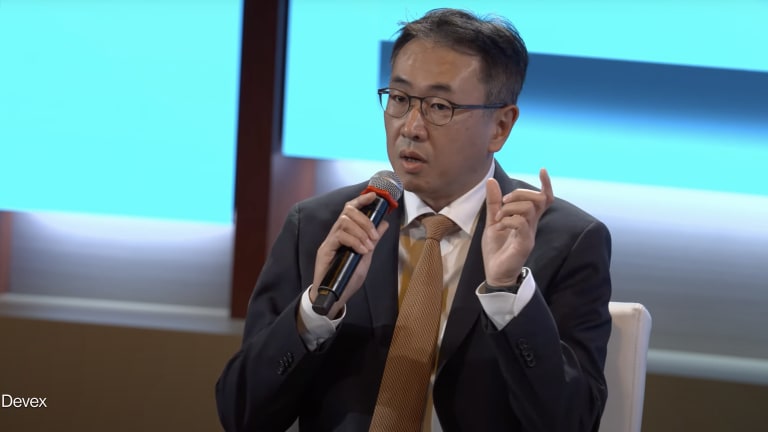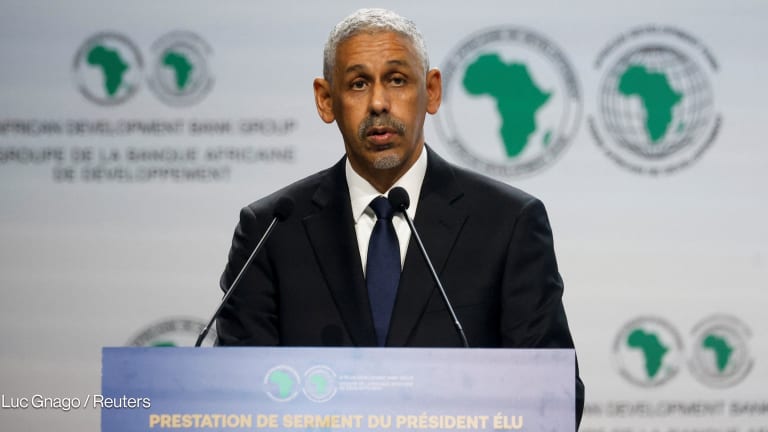
Busan, Korea — Korea invested in education long before the World Bank Group thought it should. This is the lesson — rather than Korea’s industrial policy — that World Bank President Jim Yong Kim hopes attendees take away from the African Development Bank’s 53rd annual meeting in Korea’s port city of Busan.
“I hear from many African leaders that the key to East Asian growth was industrial policy,” Kim said.
While policy played a role, it was exposure to internal competition that prepared conglomerates to compete in global markets, he clarified.
More importantly, “every single one of these East Asian countries invested in health and education before everyone thought they should,” said the Korean-born chief.
In fact, most of the countries that have risen from poverty and graduated from middle income to high income have invested in education before the World Bank deemed them ready, according to Kim, whose attendance marks the first time a World Bank president has attended an AfDB annual meeting.
Far too many countries think: “First we’ll get rich and then we’ll invest in people,” he said. “That’s the wrong way to go.”
Every single industry is becoming more technology and capital intensive, meaning Africa can no longer expect to rely on traditional forms of industrialization, he said.
Catch up on AfDB happenings:
► Thousands gather in South Korea for AfDB meetings
Accelerating Africa’s industrialization is the focus of the annual meeting and a prominent pillar of AfDB’s High 5 agenda, that calls for the development of the continent with a focus on smart industrial policy, structural transformations, and a move toward processing raw materials into value-added products — goals the bank allocated $1.2 billion in 2017 to achieve.
At country level, bold reforms are needed to improve the business environment and upgrade labor and entrepreneurship skills as well as production technology, according to AfDB.
Aside from basic infrastructure, lack of appropriate skills is one of the main constraints Africa faces in its quest to leapfrog, said AfDB President Akinwumi Adesina on Wednesday.
The bank leader listed robotics, artificial intelligence, and quantum computing as the skills mix necessary to keep up with where the world is headed, but “if you look at curriculum of universities that we have today, the curriculum are not linked to that future. I think we need to retool ourselves,” he said.
Adesina called for increased investment in research and development and also pointed to the Kigali Institute of Science and Technology as an example of the kind of educational institutions that will prepare Africa’s growing youth population for the future.
In March, AfDB approved a $30 million loan to support the establishment of the Rwanda Innovation Fund, aiming to promote the innovation economy in Rwanda and throughout East Africa. One-third of that loan will go toward training for skills development, such as how to write a business plan, Abdu Mukhtar, director of industrial and trade development for AfDB, told Devex on the sidelines of the meetings on Wednesday.
AfDB also supported the establishment of digital technology parks in Senegal and Cape Verde, where young entrepreneurs are being supported through business incubators to help grow their businesses.
On Monday, the bank signed a memorandum of understanding with the United Nations Industrial Development Organization to facilitate cooperation in agro-industry development, eco-industrial parks, investment in innovation and technology, trade and capacity building, and access to finance, among other efforts.
“Most of the lending programs we do, there is a component to develop human capital,” Mukhtar said.
For Africa, it often comes down to competing priorities, he added: “At the same time you’re trying to build infrastructure, you’re trying to build human capacity, and you also want to improve the policies … but I would say if you ask me the top two things that Africa should do — focusing on human capital development and education is number one for me, then infrastructure.”
Still, AfDB is eyeing agricultural industrialization as a top priority, and Adesina has no qualms about picking winners in terms of identifying areas of growth potential to invest in, he told the audience at a high-level panel during the meetings.
Agro-industries, ICT, building materials, hospitality, fertilizers, and transport all top the list of sectors with potential where AfDB can assist, according to the bank’s industrialization strategy.
“If you take a look at examples of various countries in Asia — whether Japan or Korea or China — what they did was, they picked areas where they thought they had comparative advantage and wanted to turn it into area of competitive advantage,” Adesina said.
“My point is this: I think that you cannot really industrialize unless you have clear direction from government directing in infrastructure and incentives.”
World Bank’s Kim warned against making assumptions about what the economy of the future will look like: “It’s a mistake to think we can pick industries that Africa will have [an] advantage in without thinking about what are all the forces that are coming at us right now.”
Rather than identifying particular industries that will take Africa forward, Kim would rather see a focus on the “set of critical inputs that will prepare us for the industry we will see,” he said, making a plug for the World Bank’s human capital index, that ranks countries according to how well they produce health and education outcomes for their populations.
The index will be published in October, and “African countries are going to have to look at that carefully — and find they’re not doing very well, many of them,” Kim said.
He encouraged the availability of more concessional financing for both health and education, and had a plea for African ministers present in Busan: “Unless you make this a top priority, what you are going to see is lots of young people who can see the world on their smartphones, who can see how well everyone lives, but then realize that they are very unprepared to compete with that world.”








